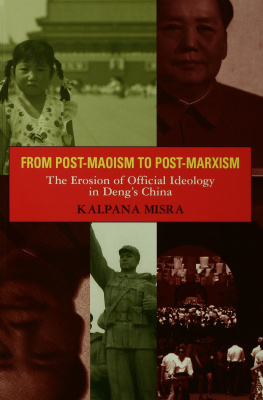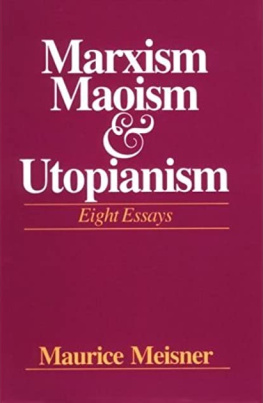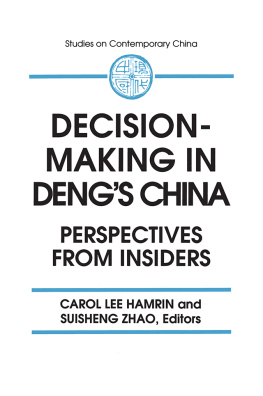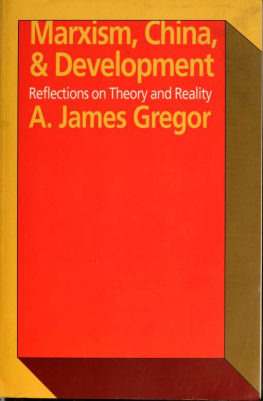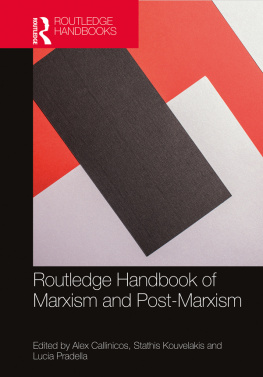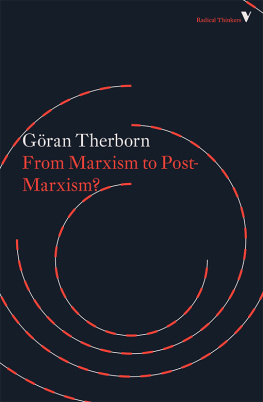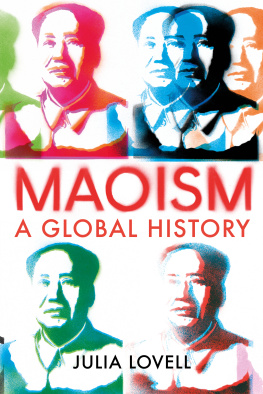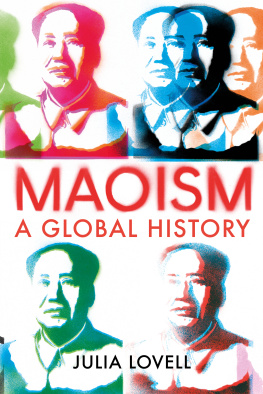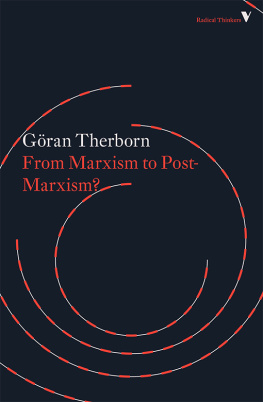FROM POST-MAOISM TO POST-MARXISM
From Post-Maoism to Post-Marxism
The Erosion of Official Ideology in Deng's China
Kalpana Misra
Routledge
New York and London
Published in 1998 by
Routledge
29 West 35th Street
New York, NY 10001
Published in Great Britain by
Routledge
11 New Fetter Lane
London EC4P 4EE
Copyright 1998 by Routledge
Printed in the United States of America on acid-free paper.
All rights reserved. No part of this book may be reprinted or reproduced or utilized in any form or by any electronic, mechanical or other means, now known or hereafter invented, including photocopying and recording, or in any information storage or retreival system, without permission in writing from the publisher.
Library of Congress Cataloging-in-Publication Data
Misra, Kalpana.
From Post-Maoism to Post-Marxism: the erosion of official
ideology in Deng's China / Kalpana Misra.
p. cm.
Includes bibliographical references.
ISBN 0-415-92032-9 (cloth). ISBN 0-415-92033-7 (pbk.)
1. CommunismChina. 2. SocialismChina.
3. IdeologyChina. 4. ChinaPolitics and government1976.
5. Teng, Hsiao-p'ing, 1904. I. Title.
HX418.5.M57 1998
320.951dc21 97-45758
CIP
Contents
I began writing this book at a time when ideology in China was not a particularly fashionable topic. For first teaching me to take the role of ideas seriously and fostering my interest in Chinese Marxism during my years at Delhi University I wish to thank Professors Tan Chung, V.P. Dutt, the late O.P. Kaushik, K.K. Misra, M. Mohanty, K.R. Sharma, Mira Sinha, and Huang I-shu.
The greatest credit for encouraging me to begin and continue work on this project at the University of Michigan goes to Michel Oksenberg, Alfred Meyer, and Donald Munro. For their intellectual guidance, rigorous standards, and challenging but supportive criticism through the successive stages of writing, I am profoundly grateful, Tu Wei-ming, who graciously gave of his time to read and reread the different drafts has also been a special source of inspiration and encouragement.
My analysis and writing have been immeasurably improved and enriched by the advice and assistance of several professional colleagues, friends, and anonymous reviewers. I deeply appreciate Su Shaozhi's time and help in clarifying certain theoretical issues. To David Kelly and Melanie Manion I owe a special debt of gratitude for their insightful suggestions and exceptional generosity in sharing sources with me. Sophia Lee has gone beyond the call of duty as friend and colleague to help me locate rare resources and contacts.
Special acknowledgement is due to Michael Mosher and Paul Thomas for their enthusiastic support and timely assistance. For their helpful suggestions, I also wish to thank P.J. Ivanhoe, James Tong, Richard Matthews, David Shambaugh, and Ray Wylie. The extraordinary efficiency of Melissa Rosati, Eric Nelson, and Lai Moy at Routledge is greatly appreciated, and I consider myself extremely fortunate to have worked with such a superb editorial team. The timely completion of this book was facilitated by the generous financial support provided by University of Tulsa research and travel grants, and the expert secretarial assistance of Toy Kelley.
Finally, I am most grateful for the patience, forbearance, and unqualified support of my family and friends that has nurtured and sustained me through every stage of this project. Whatever refinements of analysis and lucidity the book contains owes much to the insights and advice of my father, K.K. Misra, a favorite mentor and perennial source of inspiration, and my husband Murali Iyengar whose intellectual companionship has been indispensable to the evolution of my ideas and scholarship. My mother Kamal, my sisters Kamana arid Kajal, my brother Kovid, and my children Kabir and Karnika have been dazzling critics and the most exuberant supportersbut for their impatience, I would still be writing this book! Narayani Ganesh, Melanie Rich, Perry Simons, and Lois Bartlett have also been invaluable allies in sustaining my enthusiastic commitment to my endeavours and relieving the tedium of work. This expression of gratitude for an exceptional circle of family and friends is a meagre return for all that they have given me.
Mao's passing and the subsequent return of Deng Xiaoping to the forefront of Chinese politics marked the beginning of sweeping changes within the Chinese system. The shift away from the ideological preferences of the late Chairman was evident in the practical thrust of policies introduced by the immediate post-Mao regime although the successor leadership of Hua Guofeng went to great lengths to affirm the Maoist legacy and resist any criticism of radical leftism at the theoretical level, The ascendancy of Deng Xiaoping and the political decline of Hua and his cohort brought a much sharper break with the past for Deng's agenda included far-reaching economic, political and cultural change. The hallmark of the new approach was its focus on economic development accompanied by a recognition of limits to state control, which translated into an extensive depoliticization of social life and the cultural and literary spheres.
Within a decade China's economic landscape had been transformed by the emergence of special economic zones, rural markets, private enterprises, stock exchanges, and Sino-foreign joint ventures. Legitimization of consumerism and profit making accompanied the implementation of the contract responsibility system in agriculture and industry, while internationally the reformist leadership vigorously promoted extensive linkages for the purpose of attracting foreign technology, trade, and investment.
Although the reforms in the economic realm were more spectacular, changes that marked the social, political, and cultural arenas were by no means insubstantial. By the early 1980s, the political system had experienced some liberalization in an attempt to institutionalize policy making and procedures and prevent future crystallizations of "cults of personality," The partial retreat of the state acknowledged a measure of distinction between the public and the private and facilitated what many observers term the tentative emergence of a civil society, characterized by a loosening of the constraints of the danwei (work unit) system and a rapid expansion of new voluntary associations, formal and informal intellectual networks, unofficial journals, salons, study groups, and think tanks. Relaxation of state controls brought forth an infusion of popular culture from Hong Kong and Taiwan and a tremendous flowering of indigenous artistic and literary creativity exemplified in the works of the Star artists, Menglong poetry, new novels, short stories, and the productions of filmmakers like Chen Kaige and Zhang Yimou.

